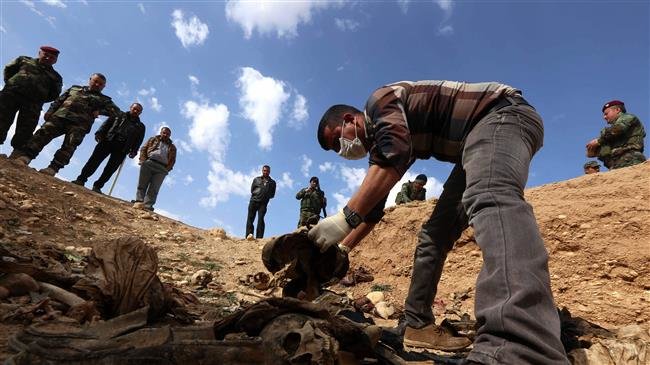Dozens of civilian bodies found in mass grave in Iraq’s Kirkuk Province


Iraqi authorities have uncovered a mass grave in the country’s northern province of Kirkuk that contains the remains of dozens of civilians believed to have been executed by Daesh Takfiri terrorists when they were in control of the area.
Adel Ismail, a lieutenant-colonel in the Iraqi federal police force, told media outlets on Friday that the latest macabre discovery was made on Thursday in the Hawija district of Kirkuk province.
The official noted the grave contained the remains of “innocent Iraqi civilians” who “were abducted and then killed” by Takfiri terrorists.
Wani Firas, a resident of the area, said it was found in what appears to be a deep well in the Al-Abbassi area of Hawija.
“This is a mass grave used by Daesh.” Firas said, adding, “They used to come here, execute and throw (the victims) inside, and we used to watch and observe from nearby.”
This comes as security forces have discovered dozens of mass graves since they drove out Daesh terrorists in 2017 after three years of occupation of swathes of northern and western Iraq.
The Office of the UN High Commissioner for Human Rights (OHCHR) says more than 200 mass graves, containing the remains of thousands of people, have been discovered in territories previously controlled by Daesh Takfiris in Iraq.
“The UN Assistance Mission for Iraq (UNAMI) and the UN Human Rights Office have documented the existence of 202 mass grave sites in the provinces of Nineveh, Kirkuk, Salahuddin and Anbar in the northern and western parts of the country,” the OHCHR said in a report published last month.
The UN body further noted that there are maybe more mass graves, and it is difficult to determine the total number of people in the mass graves.
Former Iraqi Prime Minister Haider al-Abadi declared the end of military operations against Daesh in the Arab country on December 9, 2017.
On July 10 that year, he formally declared victory over Daesh in Mosul, which served as the terrorists’ main urban stronghold in the conflict-ridden Arab country.
In the run-up to Mosul’s liberation, Iraqi army soldiers and volunteer Hashd al-Sha’abi fighters had made sweeping gains against Daesh.
Iraqi forces took control of eastern Mosul in January 2017 after 100 days of fighting, and launched the battle in the west on February 19 last year.
Daesh began a terror campaign in Iraq in 2014, overrunning vast swathes in lightning attacks.
The terrorists have been held responsible for multiple atrocities during their reign of terror, including mass executions and decapitations.








